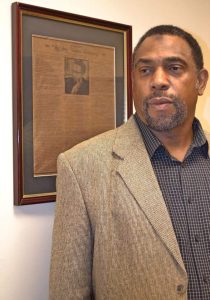Edited by Intisar Seraaj
This year isn’t just a new year, it’s the start of a new decade. This makes 33 years that Seraaj Family Homes, Inc. (SFH) has been in operation; The company has survived three decades in an everchanging and challenging business sphere. So, the communications team asked Abdul Seraaj, the CEO of SFH, to share his reflections on this past decade and his plans and goals for the future, as it pertains to the business, the whole foster care system, and himself. If you know him, you know he’s a futurist, always looking ahead to how the company will thrive in the years ahead and how employees can use technology to improve their work and succeed. But he’s also reflective and sentimental, a profuse writer in his own right when it comes to personal journaling. So, this task was right up his alley. Here are his thoughts.
The CEO Reflects Inwardly About the Last Decade
Q: What does “bringing in a new year” mean to you?
A: First, I consider myself an optimistic person. I have a strong belief that tomorrow will be better than today and yesterday. Therefore, I’m excited about the new challenges Seraaj [Family Homes, Inc.] will face in 2020. Yes, challenges. Because “with difficulty come ease.” Challenges, struggling, and adversity are ways to develop innovative problem-solving skills. Innovative thinking is what SFH is known for.
Q: How do you celebrate or commemorate the New Year?
A: I keep a personal journal and I use that journal to reflect on times that have gone by. I start the year off by making my daily prayers and reflecting on the many struggles almighty God has helped me to overcome during the past years. I reflect with gratitude and thankfulness for my blessings.
Q: What have you learned about yourself or how have you seen yourself improve in this last decade while doing this work?
A: I have learned “with difficulty comes ease” and solutions. I have learned you can be doing all the right things in life and the difficulty, adversities, and struggles will still come to you. I have learned it is all designed to make you stronger, more faithful, and prayerful. I learned that through struggle, God has conditioned and prepared me for future difficulties and the ability to overcome setbacks in my personal life and in business.
Q: Did you think the company would withstand for this long?
A: Yes, because I have spent years praying to God that SFH will outlive me. It is said that “God is to you what you imagine Him to be” in your heart and mind. Therefore, I always think about how God will help me according to the efforts I make, the prayers I make, the charity I give, and putting the safety and stability of our foster youth at the forefront.
The CEO’s Reflections on the Foster Care System & Its Professionals
Q: How have you seen the field of child welfare/social work change within the past decade?
A: The field of child welfare has become performance-based, profit-driven, technology-driven, and Medicaid-driven. Our clients and families have more generational drug and alcohol abuse, mental health issues, and severe trauma issues than in the past. Youth are coming into foster care much younger, they are seriously challenged physically and mentally, and have more health issues.
Q: What’s one misconception about foster care you want to heavily push to change this year and decade?
A: We must educate the general public about the need for foster families and why children are coming into foster care. We must teach people that foster youth are not criminals or bad kids. They’re suffering from various things and some have been seriously abused and neglected by their caregivers.
Q: What’s one thing the staff needs to focus on improving in 2020?
A: All staff members need to utilize real-time consultation, communication and collaboration using technology and mobile applications, thus, leading to innovation. In business, it is said that one must constantly innovate or die, meaning we must embrace constant change.
Q: What’s something the staff did well in 2019 that they should continue doing in 2020?
A: Many staff members have started to embrace, implement, and practice using mobile technology and applications to enhance the quality of service delivery. They also have embraced the 21st-century vision of SFH, which is to transition into working virtually rather than using the 19th-century style which is working from brick-and-mortar offices. This is especially challenging for clinical supervisors, senior managers, and licensed social workers. But staff members are learning more about how to become paperless.
Looking Back & Forward for the Company: The CEO’s Reflections & Visions
Q: What are three of your top memories or experiences working with the company from this past decade?
A:
- Learning how to thrive rather than just survive in a challenging, ever-changing, global, geopolitical economy. There are so many unexpected, outside forces and situations that can negatively affect the overall status of SFH.
- Going from the bottom to the top over a period of 14 years, and for SFH to be operating out of Baltimore, Maryland for more than 10 years. One of the most impressive things is to see the company functioning as a 21st-century technology-driven human service corporation.
- The development of The Grandma Home House Retreat (TGHHR) and our ability to connect SFH’s trainings and other company-related activities with TGHHR, including SFH’s theme, purpose, mission, values, and vision.
Q: How do you plan to make the next decade at SFH more successful?
A: We are seeking to develop SFH into a national and international foster care, family preservation, and reunification consulting and training corporation. We are seeking to restart the Al-Hajj, Inc. and Seraaj Family Homes, Inc. Virtual Training Institute, which is designed to offer professional human service training and certification services. It is designed to cut down on professionals having to travel, hotel fare, rental cars, and spending extra money on training. Most importantly, SFH will continue developing its remote workforce and developing virtual regional offices similar to the Mobile, Ala. and Huntsville, Ala. regions.
Q: What are three points for the company of focus for 2020?
A:
- Focusing on converting regional offices into virtual workspaces and staffing its regional offices with a highly-trained, remote workforce
- Increasing the productivity of workers by teaching them how to properly use technology while in the field working with their clients.
- Preparing to implement the federal Family First Prevention Services Act, which aims to provide “old school” wrap-around services. SFH similarly provides intensive in-home services like family preservation. These are the types of services that SFH was built upon when starting off in Nebraska, Iowa, and Alabama.




